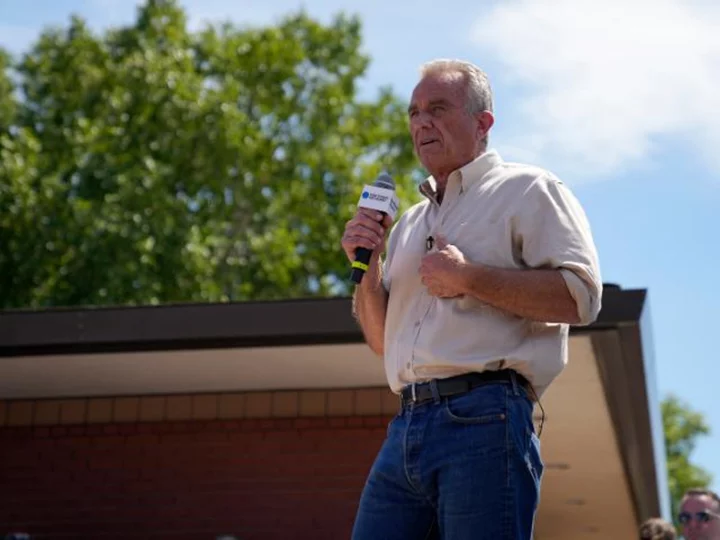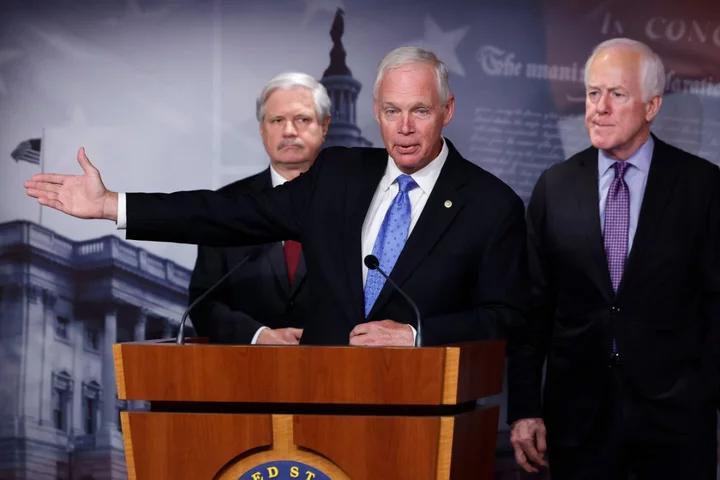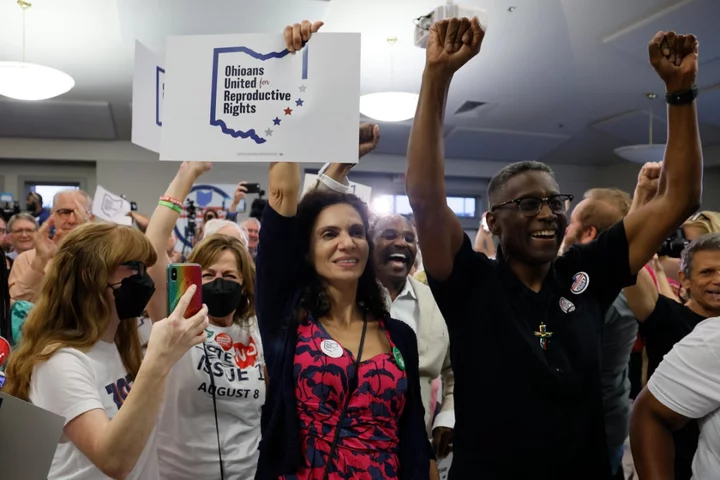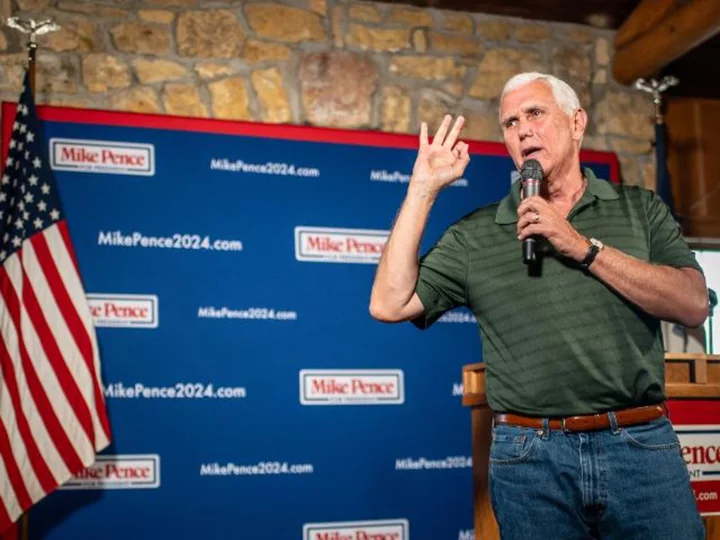
Appeals court says abortion pill mifepristone should remain on the market but rules in favor of limiting access
A federal appeals court on Wednesday wiped away a lower court's ruling that would've taken the medication abortion drug mifepristone off the market, but upheld aspects of the ruling that could cut back access to the pills.
2023-08-17 02:54

Biden administration releases 'legal resources' for colleges in response to Supreme Court's affirmative action decision
The Biden administration is releasing new guidance and "legal resources" for colleges and universities that want to ensure student diversity in the admissions process after the Supreme Court gutted affirmative action in June.
2023-08-15 00:54

RFK Jr.'s campaign tries to walk back his support of three-month federal abortion ban
Robert F. Kennedy Jr.'s campaign on Sunday evening quickly tried to walk back comments the Democratic presidential candidate had made earlier in the day in support of a nationwide abortion restriction after the first three months of pregnancy.
2023-08-14 11:15

Camp Lejeune water contamination cases increasingly becoming wrongful death claims as lawsuits proceed at a crawl
Last year, Eddie Peterson lost consciousness at his home in Memphis and stopped breathing.
2023-08-14 07:51

GOP senator amplifies conspiracy theory that Covid was ‘pre-planned’ by ‘elite’ in anti-vaccine rant on Fox
Republican Senator Ron Johnson amplified a number of Covid-19 conspiracy theories in a Fox Business Network segment bloated with false claims about the disease amid a growing number of hospitalisations and infections. While public health officials are urging Americans to stay up to date with vaccinations, the Wisconsin senator and Fox personality Maria Bartiromo falsely refuted vaccine efficacy and safety while wrongly stating that ivermectin is an approved treatment. The senator also revived baseless conspiracy theories circulated by anti-vaccine influencers like Robert F Kennedy Jr, who has faced ongoing scrutiny for his bogus suggestion that the virus is a biological weapon used to target certain demographics and spare Jewish and Chinese people. “This was all pre-planned by an elite group of people,” Mr Johnson said on the network on 11 August. “We’re up against a very powerful group of people … We are going down a very dangerous path, but it’s a path that is being laid out and planned by an elite group of people that want to take total control over our lives, and that’s what they’re doing bit by bit.” Mr Johnson and Ms Bartiromo also falsely claimed that the US Food and Drug Administration has approved ivermectin to treat Covid-19. Their bogus claims follow a recent appeals court hearing in a lawsuit from three doctors who have accused the federal agency of overstepping its authority by telling people not to take the drug. A federal judge appointed by Donald Trump dismissed the lawsuit last year. FDA attorneys argued that the agency did not prohibit doctors from prescribing the drug but had issued guidance recommending against its use. Right-wing media falsely interpreted those statements to mean that the agency now is endorsing the drug. Ms Bartiromo also admitted to taking ivermectin – which still is not authorised or approved for use in preventing or treating Covid-19 – before falsely stating that the FDA says it’s “fine” to use. “It was hard to find my doctor to finally, you know, address this and prescribe ivermectin,” she said. “He did, my Covid was gone in a day when I took ivermectin. And now three years later, the FDA says, ‘Oh, yeah, that’s fine. Take ivermectin.’” The FDA has not said that. The segment aired as Covid-related hospitalisations begin to surge across the US, increasing 12.5 per cent over the last week to more than 9,000, according to the US Centers for Disease Control and Prevention. EG.5, an offshoot of the omicron variant that sparked waves of new infections, has been circulating in the US since April, now accounting for more than 17 per cent of Covid infections, according to the CDC. Last month, Mr Kennedy – a prominent anti-vaccine conspiracy theorist who is seeking an extremely long-shot bid for the Democratic nomination for president – revived an antisemitic conspiracy that blames Jewish people for the emergence of the disease. He baselessly stated during a press event that “there is an argument to be made” that the disease is “ethnically targeted”. The Independent has requested comment from Fox and a spokesperson for Mr Johnson. Read More Everything we know about EG. 5, the Covid subvariant dominating the US Data from pharmacy chain suggests Covid cases in California have nearly doubled since June RFK Jr’s ‘horrific antisemitic and xenophobic views’ detailed in explosive report Fox News promotes conspiracy theory linking Bronny James collapse to Covid vaccine
2023-08-12 23:46

Ohio vote shows enduring power of abortion rights at ballot box, giving Democrats a path in 2024
Abortion wasn't technically on the ballot in Ohio's special election. But the overwhelming defeat of a measure that would have made it tougher to enshrine abortion rights in the state constitution this fall was the latest indicator that the issue remains a powerful force at the ballot box. The election saw heavy turnout for what's typically a sleepy summer election date and sets up another battle in November, when Ohio will be the only state this year to have reproductive rights on the ballot. It also gives hope to Democrats and other abortion rights supporters who say the matter could sway voters their way again in 2024. That's when it could affect races for president, Congress and statewide offices, and when places such as the battleground of Arizona may put abortion questions on their ballots as well. Democrats described the victory in Ohio, a one-time battleground state that has shifted markedly to the right, as a “major warning sign” for the GOP. “Republicans’ deeply unpopular war on women’s rights will cost them district after district, and we will remind voters of their toxic anti-abortion agenda every day until November,” said Aidan Johnson, a spokesperson for the Democratic Congressional Campaign Committee. The measure voters rejected Tuesday, known as Issue 1, would have required ballot questions to pass with 60% of the vote rather than a simple majority. Interest was unusually high, with millions spent on each side and voters casting more than double the number of early in-person and mail ballots ahead of the final day of voting as in a typical primary election. Early turnout was especially heavy in the Democratic-leaning counties surrounding Cleveland, Columbus and Cincinnati. Opposition to the measure, which became a kind of proxy for the November abortion vote, extended even into traditionally Republican areas. In early returns, support for the measure fell far short of Donald Trump’s performance during the 2020 election in nearly every county. The November ballot question will ask voters whether individuals should have the right to make their own reproductive health care decisions, including contraception, abortion, fertility treatment and miscarriage care. Ohio's GOP-led state government in 2019 approved a ban on abortion after cardiac activity is detected — around six weeks, before many women know they are pregnant — but the ban was not enforced because of the U.S. Supreme Court ruling in Roe v. Wade, which granted a federal right to the procedure. When a new conservative majority on the high court last year overturned the nearly 50-year-old ruling, sending authority over the procedure back to the states, Ohio's ban briefly went into effect. But a state court put the ban on hold again while a challenge alleging it violates the state constitution plays out. During the time the ban was in place, an Indiana doctor came forward to say she had performed an abortion on a 10-year-old rape victim from Ohio who could not legally have the procedure in her home state. The account became a national flashpoint in the debate over abortion rights and underscored the stakes in Ohio. Ohio is one of about half of U.S. states where citizens may bypass the Legislature and put ballot questions directly to voters, making it an option that supporters of reproductive rights have increasingly turned to since Roe v. Wade fell. After abortion rights supporters said they hoped to ask voters in November to enshrine the right in the state constitution, Ohio Republicans put Issue 1 on Tuesday’s ballot. In addition to raising the threshold to pass a measure, it would have required signatures to be collected in all 88 counties, rather than 44. The 60% threshold was no accident, abortion rights supporters say, and was aimed directly at defeating the Ohio abortion measure. Since Roe v. Wade was overturned, six states have had elections regarding reproductive rights. In every election — including in conservative states like Kansas — voters have supported abortion rights. In Kansas, 59% voted to preserve abortion rights protections, while in Michigan 57% favored an amendment that put protections in the state constitution. Last year, 59% of Ohio voters said abortion should generally be legal, according to AP VoteCast, a broad survey of the electorate. Last month, a poll by the Associated Press-NORC Center for Public Affairs Research found the majority of U.S. adults want abortion to be legal at least through the initial stages of pregnancy. The poll found that opinions on abortion remain complex, with most people believing abortion should be allowed in some circumstances and not in others. Opponents of the Ohio abortion question ran ads that suggested the measure could strip parents of their ability to make decisions about their child’s health care or to even be notified about it. Amy Natoce, spokesperson for the anti-abortion campaign Protect Women Ohio, called the ballot measure a “dangerous anti-parent amendment.” Several legal experts have said there is no language in the amendment supporting the ads’ claims. Peter Range, CEO of Ohio Right to Life, said he has been traveling across Ohio talking to people and “I’ve never seen the grassroots from the pro-life side more fired up to go and defend and protect the pre-born.” While the November question pertains strictly to Ohio, access to abortion there is pivotal to access across the Midwest, said Alison Dreith, director of strategic partnership for the abortion fund Midwest Access Coalition. Nine Midwestern states — Indiana, Iowa, Kansas, Ohio, Nebraska, Missouri, North Dakota, South Dakota and Wisconsin — are considered restrictive, very restrictive or most restrictive of abortion rights by the Guttmacher Institute, a research and policy organization that supports legal access to abortion. “Ohio in particular has always been a destination state for the states around it,” Dreith said. “If we don’t protect abortion access in Ohio, the options just continue to shrink for people seeking care in the Midwest.” Sri Thakkilapati, the executive director of the Cleveland-based nonprofit abortion clinic Preterm, said the effect of the Ohio vote will reverberate throughout the country. “When we restrict access in one state, other states have to take up that patient load,” she said. “That leads to longer wait times, more travel, higher costs for patients." Thakkilapati called the energy around abortion rights in last year's midterms “exciting.” But she said the media attention died down, and people quickly forgot “how tenuous abortion access is right now.” The special election and ballot measure in Ohio are “a reminder of what’s at stake," Thakkilapati said. “Other states are watching how this plays out in Ohio, and it may give anti-abortion groups in other states another strategy to threaten abortion rights elsewhere,” she said. “And for the majority who do want abortion access in their states but are seeing it threatened, the results in November could give them hope that the democratic process may give them relief.” Kimberly Inez McGuire, the executive director of Unite for Reproductive and Gender Equity, which focuses on young people of color under age 30, says the results of elections involving reproductive rights show that support doesn't come just from Democrats or in cities and states considered liberal bastions. “There was this idea that we couldn’t win on abortion in red states and that idea has really been smashed,” McGuire said. So, too, she said, is the “mythology” that people in the South and Midwest won't support abortion rights. “I think 2024 is going to be huge,” she said. “And I think in many ways, Ohio is a proving ground, an early fight in the lead up to 2024.” Dreith said that since abortion hasn't been on a major ballot since last year, the Ohio vote this fall is “a good reminder” for the rest of the country. “Abortion is always on the ballot — if not literally but figuratively through the politicians we elect to serve us,” she said. "It’s also a reminder that this issue isn’t going away.” Read More Ukraine war’s heaviest fight rages in east - follow live Charity boss speaks out over ‘traumatic’ encounter with royal aide Why Ohio's Issue 1 proposal failed, and how the AP called the race Ohio voters reject GOP plan to thwart upcoming abortion rights proposal Abortion rights advocates push for 2024 ballot initiative in Arizona
2023-08-09 23:50

Biden tries to bolster his climate credentials as activists push for more urgency
President Joe Biden is traveling west this week on a mission to ramp up excitement for an agenda that -- so far -- is yielding little political upside.
2023-08-09 19:18

Abortion rights advocates win major victory in Ohio as voters reject GOP plan to thwart ballot measure
Ohio voters have resoundingly rejected a measure that would make it more difficult to amend the state’s constitution, a proposal that Republican officials bluntly admitted was an effort to kneecap an upcoming ballot measure asking voters to enshrine a right to abortion care. That proposal has failed, with roughly 65 per cent of the vote tallied by Tuesday night after polls had closed, according to projections from the Associated Press. Issue 1 would have required that proposed amendments to the state constitution receive at least 60 per cent of the vote, raising the threshold substantially from a current simple majority vote. It also would have increased the minimum number of petition signatures that groups would have to collect before qualifying an issue to get on a ballot. The proposal’s failure means that a November referendum on abortion rights will need only 50 per cent of the vote to enshrine those protections into the state’s constitution, a major victory for abortion rights advocates and democratic campaigns in the aftermath of the US Supreme Court’s decision to strike down Roe v Wade. President Joe Biden called the measure a “blatant attempt to weaken voters’ voices and further erode the freedom of women to make their own health care decisions.” “Ohioans spoke loud and clear, and tonight democracy won,” he said in a statement. Within the last year, voters have also turned out in record numbers to protect abortion rights in California, Kansas, Michigan and Vermont, underscoring the overwhelming unpopularity of the Supreme Court’s decision and the volatile landscape for reproductive healthcare in its wake, while scrambling anti-abortion campaigns from Republican officials emboldened by the ruling. Issue 1 campaign Protect Our Constitution was largely supported by GOP mega-donor and Illinois businessman Richard Uihlein. A coalition of abortion right, civil rights and democratic advocacy groups joined a No On Issue 1 campaign. “Tonight was a major victory for democracy in Ohio,” the group said in a statement following projections of the measure’s defeat. “The majority still rules in Ohio, and the people’s power has been preserved – because Ohio voters showed up and overwhelmingly voted down Issue 1.” Ohio voters saw the proposal for “what it was: a deceptive power grab designed to silence their voices and diminish their voting power,” the group added. Kelly Hall, executive director of the Fairness Project, said the results mark an “incredibly profound and inspiring day for democracy”. “When faced with the choice of whether to allow politicians and special interests to consolidate power and strip voters of their rights, Ohioans fought back,” she said in a statement. “The defeat of Issue 1 should send a clear message to other extremist officials around the country that democracy will not die; people are ready to defend their rights against blatant attacks like Issue 1.” The upcoming proposal for a constitutional amendment in November will ask Ohio voters whether “every individual has a right to make and carry out one’s reproductive decisions.” After the Supreme Court’s ruling in Dobbs v Jackson Women’s Health Organization last June, Ohio lawmakers swiftly outlawed most abortion after roughly six weeks of pregnancy, a law that is currently suspended by a state court injunction but could be reinstated by the state Supreme Court. A vote to enshrine abortion rights in the state’s constitution would effectively overrule any such law. Abortion rights advocates and providers have warned that Ohio’s ban, which does not include exceptions for pregnancies from rape or incest, ignited a healthcare crisis that endangered patients and their families across the state, forcing people to seek care hundreds of miles out of state and navigate complicated legal and medical minefields while experiencing pregnancy complications. Ohio Republicans initially canceled August elections altogether, which have historically low turnout. But in May, they reversed that decision to put Issue 1 on the ballot – a decision that appears to have backfired for them. Nearly 600,000 Ohio voters cast their ballots early, with voters reporting busy polling locations across the state on election day. Read More Texas judge sides with women after harrowing testimony over anti-abortion law DeSantis won’t rule out national abortion ban but suggests there’s no ‘mileage’ left in Congress
2023-08-09 11:28

Pence rolls out energy plan with goal to make US top energy producer by 2040
Former Vice President Mike Pence on Tuesday outlined his energy policy plan with the goal to overtake China as the world's top energy producer by 2040.
2023-08-09 03:16

Proposed constitutional change before Ohio voters could determine abortion rights in the state
Ohio concludes a hastily called and highly charged special election Tuesday, a contest that could determine the fate of abortion rights in the state and fuel political playbooks nationally heading into 2024. On the ballot is Issue 1, a proposal to raise the threshold for passing future changes to the state's constitution from a simple majority to 60%. But more passionately in the sights of the proposal's backers — including Republican officeholders — is a proposed constitutional amendment on the November ballot that calls for enshrining access to reproductive care in the state's foundational document. The measure was clearly resonating with voters, who turned out in huge numbers during the early voting period, which ended Sunday. The number of advance ballots cast — a combination of mail and early in-person ballots — hit nearly 700,000, more than double the early vote during the state's two previous midterm primary elections in 2022 and 2018. Ohio's August elections have historically focused on local issues and been plagued with chronically low turnout. The Republican lawmakers who backed Issue 1 maintained that the measure was not about thwarting the fall abortion amendment, despite reinstating an August special election just like the ones they had only recently voted to eliminate. Raising the bar for passing citizen-led constitutional amendments could make it difficult, if not impossible, for the fall proposal to succeed, based on polling figures. Voters in several states, even deeply conservative ones, have affirmed abortion rights since the U.S. Supreme Court overturned Roe v. Wade last year, though usually with less than 60% of the vote. AP VoteCast polling last year found that 59% of Ohio voters say abortion should generally be legal. Out-of-state money has poured into both sides of the contest over the 60% threshold, even as both supporters and opponents say one of their main goals is to keep special interests from having more influence over state policy than average Ohioans. The campaign in favor of Issue 1, Protect Our Constitution, has told voters that raising the threshold will keep deep-pocketed interest groups from pushing redistricting, gun control and minimum wage policies on Ohio. One Person One Vote, the opposition campaign, argues that raising the threshold for passing future amendments would prioritize the interests of Ohio's increasingly conservative GOP supermajority at the statehouse over those of everyday voters. But abortion rights are at the epicenter of the fight, as Ohio and other states have been given control of their own abortion policies following the Supreme Court overturning Roe v. Wade last summer. Ohio's ban on most abortions had been placed on hold under Roe and then allowed to take effect briefly after the court overturned it. Since then, it has been frozen again while a challenge alleging it violates the state constitution plays out. The abortion amendment would give individuals the right to make their own reproductive health care decisions, including on contraception, fertility treatment, abortion and miscarriage care, until a fetus is viable outside the womb. At the same time, a broad bipartisan coalition opposes Issue 1 for other reasons. Former Ohio governors and attorneys general of both parties have come out against the constitutional change, calling it poor public policy. If passed it would reverse 111 years of direct democracy that has the potential to affect future citizen-led ballot efforts. Protect Women Ohio, the campaign against the fall abortion question, has spent millions on the August election — airing ads suggesting the measure not only codifies abortion, but could pressure children into receiving gender-affirming care and undercut parental rights. Several legal experts have said there is no language in the amendment supporting the ads' claims, but it follows a pattern through this election cycle of misinformation and fear-mongering being used to sway voters. Issue 1 opponents have aired ads and mobilized a large coalition, including voting rights, labor, faith and community groups, as well as the state Democratic Party. It was because of chronically low turnout that lawmakers voted just last year to scrap summer elections, prompting an unsuccessful lawsuit alleging this year's August special election violated the new law and calling further into question if it was brought back solely to thwart abortion rights for Ohioans. ___ The Associated Press receives support from several private foundations to enhance its explanatory coverage of elections and democracy. See more about AP’s democracy initiative here. The AP is solely responsible for all content. ___ Samantha Hendrickson is a corps member for the Associated Press/Report for America Statehouse News Initiative. Report for America is a nonprofit national service program that places journalists in local newsrooms to report on undercovered issues. Read More Ukraine war’s heaviest fight rages in east - follow live Charity boss speaks out over ‘traumatic’ encounter with royal aide Attacks at US medical centers show why health care is one of the nation's most violent fields Ohio election that revolves around abortion rights fueled by national groups, money Taylor Swift bracelet-trading trend makes way to Women’s World Cup in Australia
2023-08-08 12:25

DeSantis won’t rule out national abortion ban but suggests there’s no ‘mileage’ left in Congress
Ron DeSantis has not ruled out enacting a national abortion “ban” if elected president, after the Florida governor implemented state restrictions on abortion access at 15 weeks and six weeks of pregnancy within the last two years. But he suggested that there is no “consensus” in the US for members of Congress to implement a national ban, as abortion restrictions and the US Supreme Court’s decision to overturn Roe v Wade remain overwhelmingly unpopular. Asked by NBC’s Dasha Burns whether he would “veto any sort of federal bill” that would institute a nationwide ban, Mr DeSantis replied: “We will be a pro-life president and we will support pro-life policies.” In the wake of the Supreme Court’s decision to revoke a constitutional right to abortion care last year, Republican officials have repeatedly stated that the ruling merely left it up to individual states to decide. But anti-abortion lawmakers at the state level and in Congress continue to push for national restrictions that would also strike down state laws that protect and expand abortion access. Congressional Republicans have already passed several anti-abortion measures with national implications and have signalled the GOP’s readiness to ban abortion at certain gestational limits. President Joe Biden has promised to veto any such legislation, if it made it through Congress. In media appearances throughout his campaign, the governor has not directly answered whether he would support or veto legislation that would enact national abortion restrictions, suggesting that the issue should come from the “bottom up” with individual states determining policy. His statements have drawn criticism from influential anti-abortion group Susan B Anthony Pro-Life America, which called the governor’s position “unacceptable” to anti-abortion voters. Meanwhile, his campaign’s top donor has threatened to stop funding the candidate over his “extreme” position on abortion. And Donald Trump, who has taken credit for the Supreme Court’s decision in Dobbs v Jackson Women’s Health Organization, has suggested that his rival for the 2024 Republican nomination for president has gone too far with a state law that bans abortion at six weeks of pregnancy, signed into law just one year after a 15-week limit was put in place. “Dobbs returned it to the political branches. I think the reality is that that basically means the states are going to have primary control over it,” Mr DeSantis told NBC. “You know, I do think the federal government would have an interest in, say, preventing post-birth abortions or things that are really horrific, but I don’t think that there’s enough consensus in the country to see a lot of mileage in Congress,” he added. There is no such thing as a “post-birth” abortion; killing an infant after birth is illegal in all states, and pregnancies resulting in the death of the fetus in the third trimester are exceedingly rare, and largely involve fetal anomalies and life-threatening medical emergencies. The vast majority of abortions take place within the first trimester, while roughly 1 per cent occur after 21 weeks, according to the US Centers for Disease Control and Prevention. The governor also suggested that Democratic officials support “infanticide”, echoing his remarks in a recent CNN interview claiming that “liberal state” allow “post-birth” abortion. “I would not allow what a lot of the left wants to do, which is to override pro-life protections throughout the country all the way up really to the moment of birth in some instances, which I think is infanticide,” he told NBC News. Ms Burns interrupted Mr DeSantis: “That’s a misrepresentation of what’s happening.” The governor also said that he does not support penalties for people who seek abortions. “Not at all,” he told Ms Burns. “No, I don’t think this is an issue about the woman. I think a lot of these women, you know, are in very difficult circumstances. They don’t get any support from a lot of the fathers. And a lot of them, the number one reason why women choose to have an abortion is because they’re not getting support and they feel abandoned. Now, in Florida we’ve provided support and we’ve put our money where our mouth is, but at the end of the day, you know, I would not support any penalties on a woman.” Mr DeSantis also told NBC that he does not support limits on contraception access. “And I think it should be available over-the-counter, and I think people should be able to have access to it,” he added. Read More Texas judge sides with women after harrowing testimony over anti-abortion law Alabama health care providers sue over threat of prosecution for abortion help ‘Walmart Melania’, ‘America’s Karen’ or ‘Tacky Onassis’: Why Casey DeSantis matters to the 2024 race Senator who once worked at a Planned Parenthood warns that Republicans are planning a national abortion ban
2023-08-08 00:54

DeSantis once again defends slavery curriculum: Enslaved people ‘showing resourcefulness’ developed ‘skills’
Ron DeSantis continues to defend newly approved curriculum guidelines in Florida instructing students to learn that enslaved people “developed skills” that could be “applied for personal benefit”. “That means they developed skills in spite of slavery, not because of slavery,” the governor told NBC News in a recent interview that aired on 7 August. “It was them showing resourcefulness and then using those skills once slavery ended,” he added. Mr DeSantis, who is seeking the Republican nomination for president in 2024, has dismissed criticism from Vice President Kamala Harris and Democratic and Republican members of Congress urging Florida officials to amend the state’s African American history standards and reflect an honest history of race and racism in school curricula. The vice president has also rejected an invitation from Mr DeSantis to “discuss” the standards, telling a crowd in Orlando earlier this month that “there is no roundtable, no lecture, no invitation we will accept to debate an undeniable fact: there were no redeeming qualities of slavery.” Mr DeSantis had previously stated he “wasn’t involved” with the guidelines approved by the state’s appointed Board of Education. He said the standards are “probably going to show some of the folks” – enslaved people – “that eventually parlayed, you know, being a blacksmith into doing things later in life.” The development of such “skills” would not have benefited the millions of enslaved people in the US in the decades before slavery’s abolition. Another controversial guideline instructs high schoolers to be taught that a massacre in the state led by white supremacists against Black residents to stop them from voting in 1920 included “acts of violence perpetrated against and by African Americans.” “Adults know what slavery really was. It involved rape, it involved torture, it involved taking a baby from their mother, it involved some of the worst examples of depriving humanity of people in our world,” Ms Harris said in her remarks in Jacksonville last month. South Carolina Senator Tim Scott, the only Black Republican in the Senate, echoed Ms Harris in his criticism of the standards, stressing that slavery was defined by “separating families, about mutilating humans and even raping their wives”. “It was just devastating,” said Mr Scott, who is also seeking the 2024 Republican nomination. “So I would hope that every person in our country – and certainly running for president – would appreciate that.” Mr DeSantis told NBC in response: “Don’t take that side of Kamala Harris against the state of Florida. Don’t indulge those lies.” The new standards join the governor’s overhaul of public education and a “parents’ rights” agenda that targets honest lessons on race and racism and gender and sexuality, which the governor told NBC amounts to “indoctrination”. “Those standards were not political at all,” he added. “The legislature didn’t dictate any of that. [The] governor’s office didn’t dictate anything of that.” Last week, before thousands of high school students enrolled in advanced placement courses begin classes for the 2023-2024 school year, the DeSantis administration criticised the College Board’s warning that Florida education officials had “effectively banned” AP Psychology courses in the state under the Parental Rights in Education Act, what opponents have derided as the “Don’t Say Gay” law. Read More Ron DeSantis admits ‘of course’ Donald Trump lost the election DeSantis blasted for ‘un-American’ restrictions on AP psychology course under ‘Don’t Say Gay’ law Why Florida’s new curriculum on slavery is becoming a political headache for Ron DeSantis
2023-08-07 22:56
